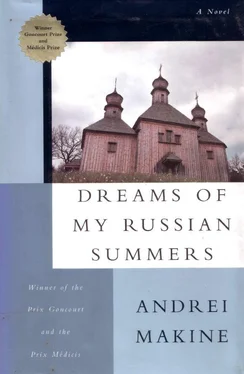She set off and she saw everything. She braved the country's endlessness, its fleeting space in which days and years are swallowed up. She went forward nonetheless, squelching through this stagnant time. By train, by farm cart, on foot…
She saw everything. Horses in harness, a whole herd of them, galloping riderless across a plain, stopping for a moment, then taking fright and resuming their mad race, both happy and fearful at their new-won liberty. One of these fugitives caught everyone's eye. A saber, deeply embedded in the saddle, stood erect upon its back. As the horse galloped, the long blade jammed into the thick leather swayed pliantly, glittering in the sinking sun. People kept their eyes fixed on the scarlet flashes, which gradually faded in the mist of the fields. They knew that this saber, its hilt filled with lead, must have cut a body in two – from shoulder to stomach – before becoming stuck in the leather. And the two halves had slipped off into the trampled grass, one each side.
She also saw dead horses being hauled out of wells. And new wells being dug in the thick, heavy earth. The timbers of the cage that the peasants lowered to the bottom of the pit smelled of fresh wood.
She saw a group of villagers, under the direction of a man in a black leather jacket, pulling on a thick rope wound round the cupola of a church, round the cross. The repeated cracking sounds seemed to fire their enthusiasm. And in another village, very early in the morning, she saw an old woman kneeling before the dome of a church cast down among the tombs of an unfenced cemetery, open to the fragile resonance of the fields.
She went through deserted villages where the orchards were glutted with overripe fruit, falling into the grass or withering on the bough. She stayed in a town where, one day at the market, a salesman mutilated a child who had tried to steal an apple from him. All the men she encountered seemed either to be rushing toward an unknown goal, mobbing trains, getting crushed on landing stages, or else waiting, one never knew for whom, before the closed doors of shops, at gates guarded by soldiers, and sometimes quite simply by the roadside.
The space she confronted knew no happy medium: incredible throngs of people would suddenly give way to a complete wilderness where the immensity of the sky and the depth of the forests made the presence of man unthinkable. Then without transition this emptiness would run into a ferocious jostling of peasants, slithering about on the muddy bank of a river, swollen by the autumn rains. That was something else Charlotte saw. Angry peasants with long poles pushing away a barge, from which arose an unceasing lament. On board could be seen silhouettes holding out their emaciated hands toward the shore. They were victims of typhus, abandoned, who had been drifting on their floating cemetery for several days. At each attempt to go ashore the bank dwellers mobilized to prevent them from doing so. The barge continued its funerary voyage; the people were dying from hunger now as well. Soon they would no longer have the strength to attempt a landing, and the last survivors, woken one day by the powerful and rhythmic sound of the waves, would behold the indifferent horizon of the Caspian Sea…
At the edge of a wood, one glittering frosty morning, she saw shadows hanging from the trees, saw the emaciated rictuses of hanged men nobody had any thought of burying. And very high up, in the sunlit blue of the sky, a flock of migratory birds was slowly melting away, accentuating the silence with the echo of their noisy cries.
* * *
The heavy and syncopated breathing of this Russian world no longer terrified her. She had learned so much since she began her journey. She knew that in a railway carriage or on a farm wagon it was practical to carry a bag stuffed with straw, with a few pebbles right at the bottom. This was what the bandits would snatch in their nocturnal raids. She knew that the best place on the roof of a railway carriage was the one near the ventilation hole: it was to this opening that ropes were attached, which enabled you to get down and climb up again quickly. And when by good fortune she found a place in a crowded corridor, she would not be surprised to see a frightened child being passed from hand to hand toward the exit by the people piled on the ground floor. The ones crouched near the door would open it and hold the child above the footboard while it did its business. This passing down the line seemed rather to amuse them: they smiled, touched by this little creature wordlessly allowing itself to be handled in this way, moved by its very natural urge in this inhuman universe… No surprise either when whispering was heard above the clatter of the rails in the night: they were communicating the death of a passenger, lost deep among this confusion of lives.
Only once in the course of this long journey, punctuated by suffering, blood, illness, mud, did she believe she had caught a glimpse of a modicum of serenity and wisdom. She had already reached the far side of the Urals. On the way out of a village half consumed by a fire she saw several men sitting on a bank scattered with dead leaves. Their pale faces, turned toward the mild late autumn sun, radiated a blissful calm. The peasant who was driving the cart jerked his head and explained softly, "Poor people, there are a dozen of them wandering round here now. Their asylum was burnt down. Oh, yes, madmen, you know."
Nothing could surprise her anymore, nothing.
Often, squeezed into the airless darkness of a railway carriage, she had a dream – brief, luminous, and completely improbable. For example, those enormous camels in falling snow, turning their disdainful heads toward a church as four soldiers emerged from the door, dragging behind them a priest who was admonishing them in a broken voice. The camels with snow-covered humps, the church, the gleeful crowd… As she slept, Charlotte recalled that time was when such humped silhouettes would be inseparable from palm trees in the desert, oases…
Then she emerged from her torpor: and it was not a dream! She was actually standing there in the midst of a noisy market in an unknown town. The heavy snow clung to her eyelashes. Passersby came up and felt the little silver medallion she was hoping to exchange for bread. The camels towered over the swarming traders, like strange drakkar ships mounted on stilts. And under the amused stares of the crowd the soldiers were pushing the priest along in a sledge stuffed with straw.
After that spurious dream the evening stroll she took was so ordinary, so real. She crossed a street with paving stones that shone by the misty light of a street lamp, pushed open the door of a baker's shop. Its warm, well-lit interior seemed familiar to her, right down to the color of the varnished wood of the counter and the arrangement of the cakes and chocolates in the window. The shopkeeper smiled kindly at her, as she would to a regular customer, and offered her a loaf. In the street Charlotte stopped, overcome with perplexity. She should have bought much more bread! Two, three, no, four loaves! She should have noted the name of the street where this excellent bakery was located. She approached the corner house and looked up. But the letters had an odd, hazy look: they merged into one another, twinkled. "Oh, how stupid I am!" she suddenly thought. "This is the street where my uncle lives…"
She woke with a start. The train, stopped in open countryside, was filled with a confused hubbub: a gang had killed the driver and was currently working its way through the train, confiscating everything it could lay its hands on. Charlotte took off her shawl and covered her head, knotting the corners under her chin as old peasant women do. Then, still smiling at the memory of her dream, she placed on her lap a bag stuffed with old rags wrapped round a stone…
Читать дальше












